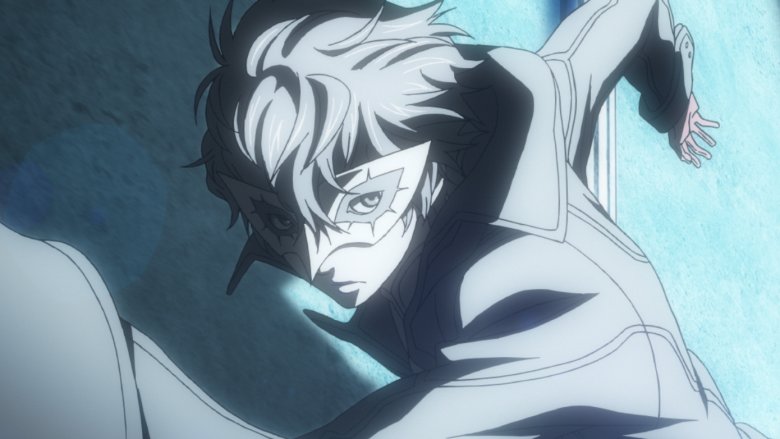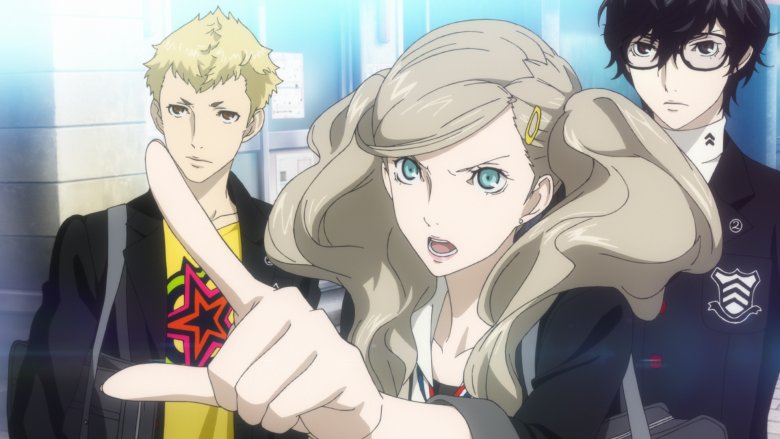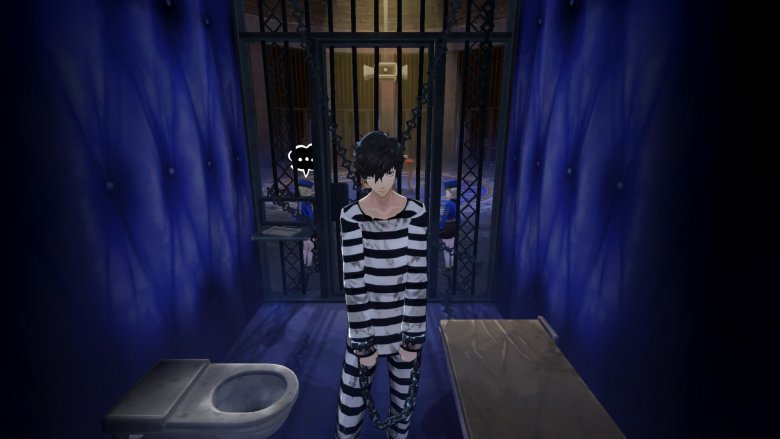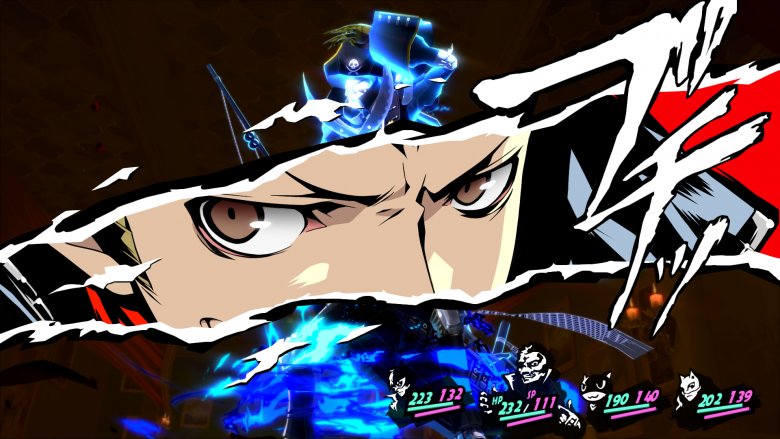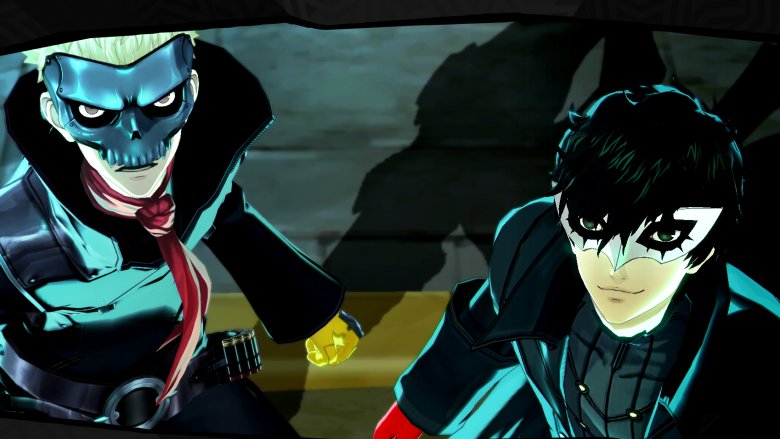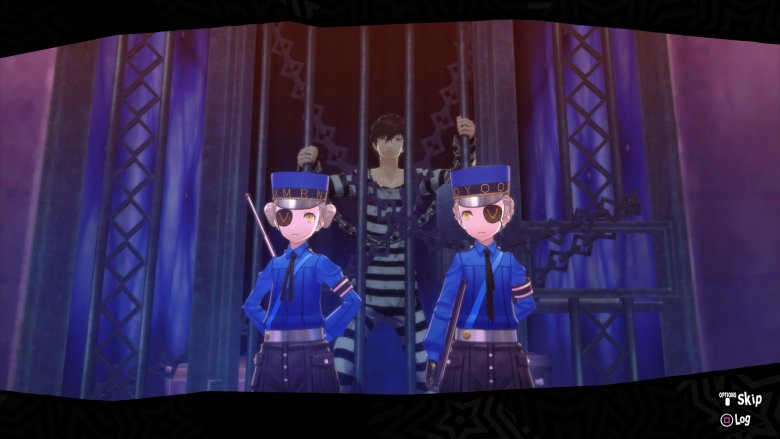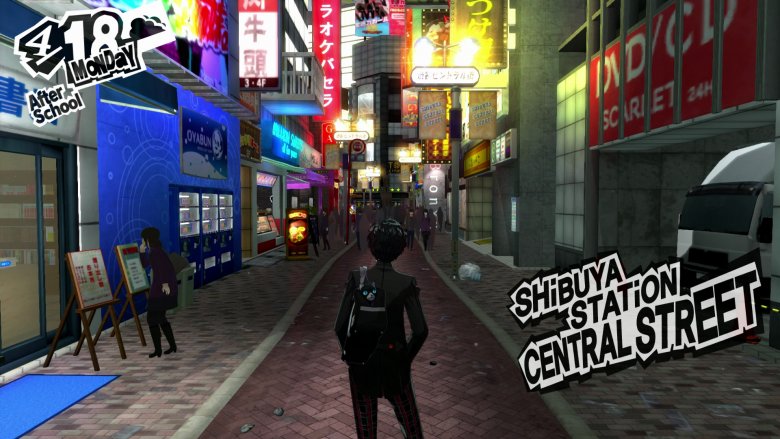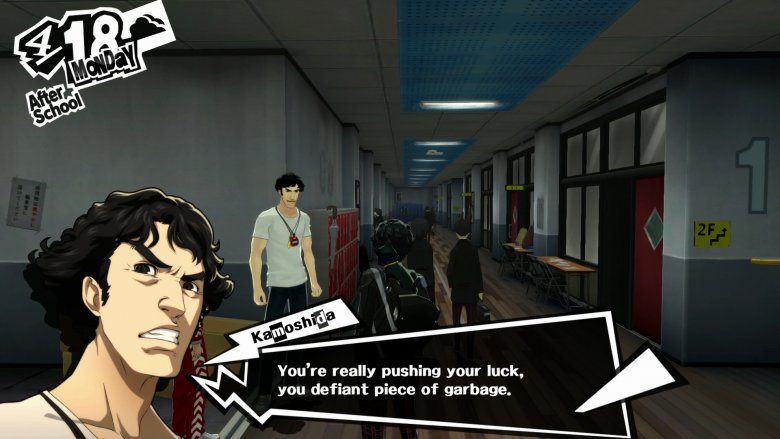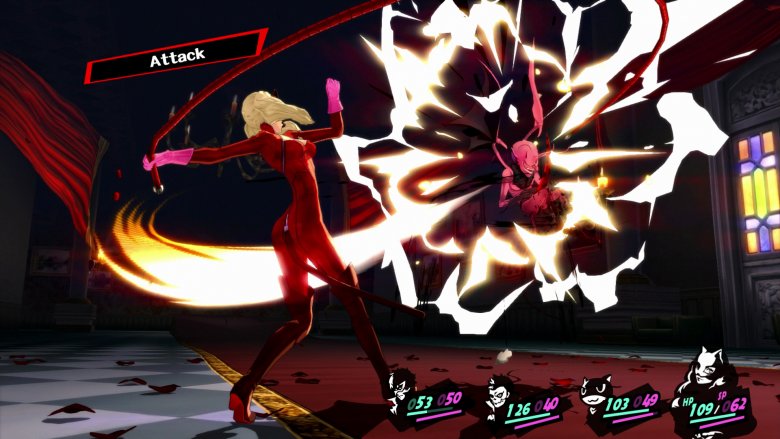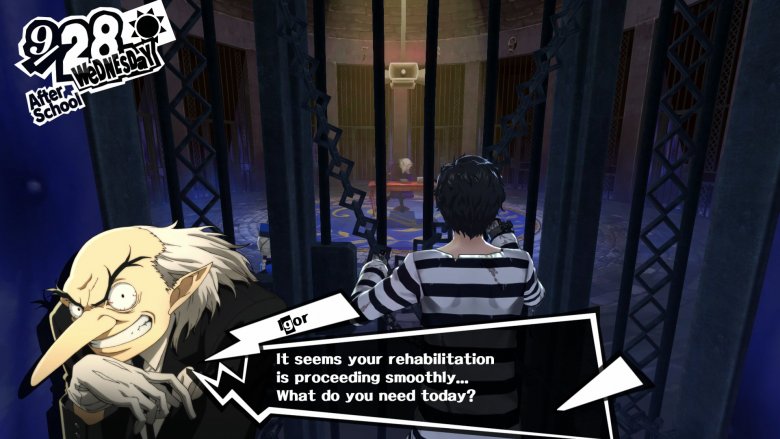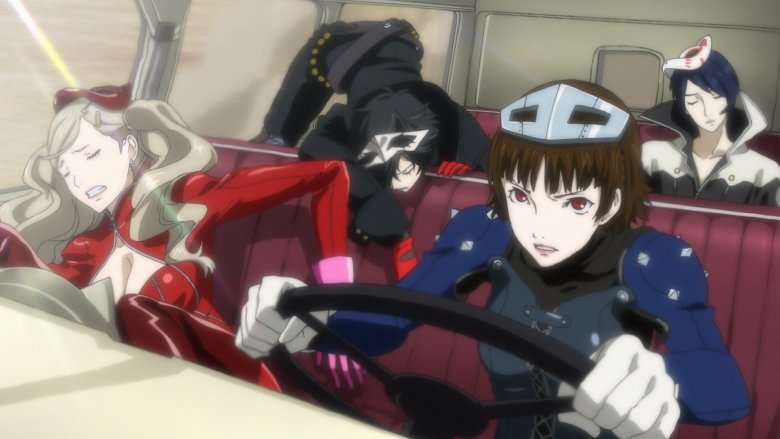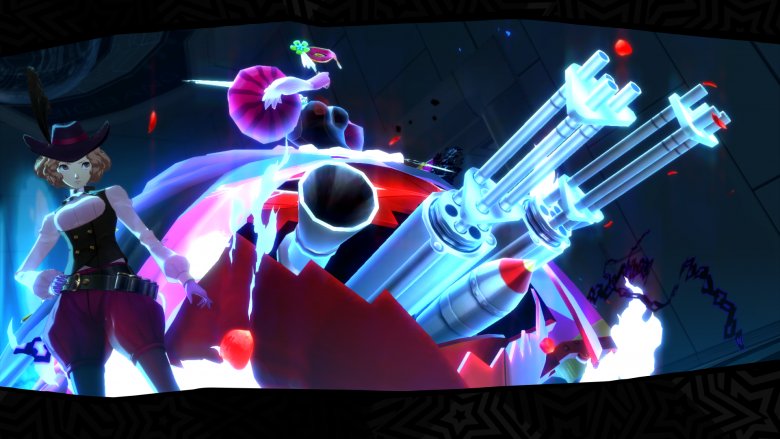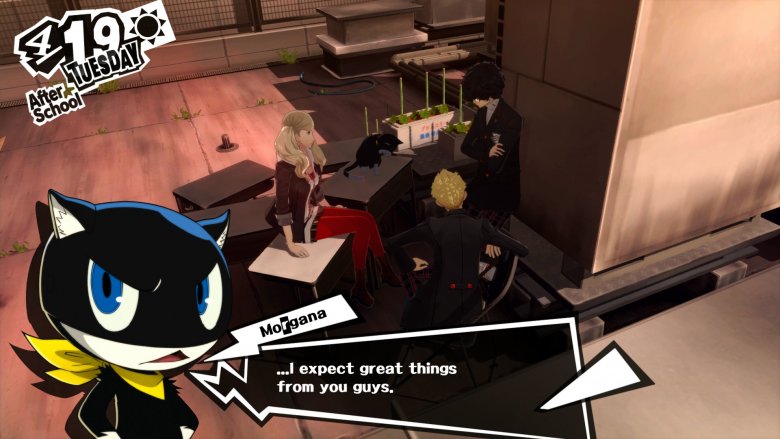We Finally Understand The Endings Of Persona 5
Since Persona 3, the JRPG series from Atlus has acquired cult status, with Persona 4 and its Golden remake helping the series break into the mainstream. Since 2012, fans waited for a sequel to the franchise, and Atlus delivered with the critically acclaimed Persona 5, which sold nearly three million copies by April 2019. Long story short, if you're a JRPG afficionado, Persona 5's rebellious hearts should be on your radar.
Since the game's release, we've had some time to digest the endings of the gargantuan story. Granted, there's only one true ending, but the other bad endings are worth looking at as well. There are a lot of thematic elements that go into Persona 5, some of which apply more to Japanese society. Nonetheless, everyone can walk away from the game with a new lesson learned.
Join us as we unravel the true meaning behind the twisting narrative of Persona 5. Who knows, maybe along the way, you'll find your own rebellious heart. And of course, there will be spoilers.
The setup of Persona 5
Let's start with a quick primer on Persona 5. We follow a silent protagonist, whose code name is Joker. He leads a group of misfits called the Phantom Thieves. They can travel between the real world and an alternate reality called the Metaverse, a world where people's twisted desires manifest in dark ways. Extremely deranged desires create Palaces, where that person's perspective of the world becomes a reality.
The Phantom Thieves infiltrate these cognitions in the Metaverse, with the goal of changing the Palace owners' hearts. If successful, the real world person will suddenly feel immense guilt, often confessing to their crimes. The thieves protect themselves from the shadows in these Palaces by using their Personas, which act as manifestations of their will to rebel against a controlling society.
Mementos is a special Palace, in that it houses the collective desires of society. At the end of Mementos, the thieves find Yaldabaoth, the god of control. He feeds off society's apathy, and he blames humanity for being too comfortable with being controlled. He decides to take over humans, but our heroes eventually topple the god to save the day.
You can get a bad ending in less than a minute
When the game boots up, an ominous, booming voice will warn you that the game is a work of fiction. Despite its intimidating nature, it's a standard, boilerplate disclaimer that shows up before many movies, books, and TV shows.
Persona 5 makes a statement, however, when it offers you a choice to agree or disagree. If you agree, the game goes on as intended. For those who say no, though, this is where the game ends. The voice "cannot allow you to partake of this game," and you get sent right back to the main menu.
The voice brings up that your cognition of the game would be that it's real, which ties into a big running theme in the Persona games. Every Palace forms out of a person's view of the world, or their "cognition." Later in the game, Yaldabaoth tries to kill the Phantom Thieves by erasing society's cognition of them.
There are tons of bad endings
In most of the Palaces, you have to fulfill a certain goal before an arbitrary in-game deadline. If you don't meet the criteria, you'll actually trigger a bad ending, and there's one for nearly every dungeon. These are more like game over screens than anything else. In the first seven dungeons, if you fail, Joker gets arrested. Considering his (false) criminal record, getting arrested again ends his journey. In some cases, even worse things happen to the people around Joker.
For example, missing the third dungeon's deadline causes one of his friends to go missing. She's later found heavily drugged saying Joker's name, causing the police to take him in for questioning. Missing the seventh dungeon's deadline causes a small task force to storm into Joker's room. They arrest him for being the leader of the Phantom Thieves, and ally-turned-traitor Goro Akechi pins the murder of a policeman on Joker.
Additionally, in the fifth dungeon, there's a sequence that requires the Phantom Thieves to reach a spot on the map within a certain time limit. If they don't, the boss escapes the dungeon, blowing it up and killing our heroes.
Joker can sell out his friends in one of the worst endings
Now we're getting into the meatier bad endings of Persona 5. A majority of the game is told in flashbacks, with the "present" taking place in an interrogation cell. Joker had been captured at the end of the sixth Palace, and the player gets to play everything up until that point. Once caught up, the interrogator, Sae Niijima, will ask Joker to confirm the identities of his accomplices. The obvious, heroic choice here is to not give up his friends.
However, the game doesn't put up much of a fight if you make the wrong choice here. By giving up the rest of the thieves, you trigger a bad ending for the game. Niijima leaves the room after chiding Joker for not having a backbone. She'll run into Akechi just outside the room, who claims he needs to interrogate Joker as well.
Akechi enters the room with an armed guard. Then the villain disarms the guard, killing him with his own gun. Akechi then sets his sights on Joker, mocking our hero's sense of "justice." He shoots Joker in the head, and the game ends here.
Joker can side with Persona 5's god of control
Partway through the final dungeon of Persona 5, all the plot twists start revealing themselves. Igor, the trustworthy inhabitant of the Velvet Room, turns out to be Yaldabaoth in disguise. For a majority of the game, Joker had been interacting with the ultimate antagonist without even knowing it.
At this point in the narrative, the Phantom Thieves have all been imprisoned in the Velvet Room, while the real world has been merged with the Metaverse. Yaldabaoth has turned reality into a terrifying nightmare, all in an effort to control everything. He offers to return everything to the way it once was if Joker gives up his crusade.
The player can choose to take the deal, and in a way, it saves the world. However, that peace comes at the cost of humanity's independence. In this world, the Phantom Thieves are popular with the masses because everyone relies on them to solve society's problems. Average citizens stop taking initiative for themselves, pushing their issues along until someone else deals with them. This ending implies that Joker took the deal out of malice, considering the evil smile he makes toward the end.
In the true ending, Joker defeats Yaldabaoth
Of course, in the true ending of Persona 5, Joker doesn't take Yaldabaoth's hollow deal. Instead, he helps fuse Caroline and Justine, the two guards of the Velvet Room. This returns them to their original form, and her name is now Lavenza. She helps Joker free the rest of the Phantom Thieves, and they all come together to make a final stand against Yaldabaoth.
Despite being in a world where the people of Tokyo have lost faith in the Phantom Thieves, our heroes fight their way to the god of control. They confront him, and at first, they struggle to defeat him. But Joker's non-superpowered allies rally the people of Tokyo. Their newfound belief in the Phantom Thieves — in other words, their cognition that the thieves will win — powers up Joker, giving him the strength to banish Yaldabaoth.
In the process the Metaverse collapses, returning reality back to the way it was. Humanity regains a new sense of control over itself, sparking a new wave of individual independence in Tokyo society. With the Metaverse gone, no one else can wrongfully exploit the Metaverse for their own gains.
The Phantom Thieves unravel a conspiracy
By defeating Yaldabaoth and destroying the Metaverse, the Phantom Thieves destroyed a conspiracy that had been controlling Tokyo. The key villains of almost every palace leading up to Yaldabaoth all worked together behind the scenes. Masayoshi Shido, the enemy of the seventh Palace, wanted to be the prime minister of the country. He'd use his new position to get rid of his political enemies, ruling Japan with an iron fist. Other Palace bosses, like Kaneshiro and Madarame, contributed in other ways, including financially. Akechi acted as the assassin for the group, although he planned to double cross Shido in the end.
Additionally, many of the core members of the conspiracy represent the classic mortal sins, like lust and greed. Kaneshiro lived a lavish life, embodying gluttony, while Shido represented the pitfalls of pride. By beating one after another, these bosses serve as the thematic building blocks that lead to Yaldabaoth, who condemns humanity for giving into those sins. As if to prove it, he contributes to the conspiracy, stoking the fires of greed and pride that fuels them.
In the end, Yaldabaoth wanted to control everything
In Yaldabaoth's eyes, the mortal sins contribute to humanity's self-destruction, which births society's desire to be controlled. Because of one sin or another, humans will shrug off responsibilities, leaving it to someone else. Yaldabaoth decided to be that inevitable "someone else," taking on all of humanity's issues. He acts as if he's a benevolent god, taking on society's problems and creating order for all.
For the Phantom Thieves, this approach comes off as far too heavy-handed. To them, humans wouldn't ask for some almighty force to make all their decisions for them. Once that happens, people lose their individuality and become enslaved. To prevent that dreary future, the thieves fight back. In a way, they represent humanity's rebellious soul, embodying our innate desire to be the arbiters of our own destiny. When the people of Tokyo start to believe in our heroes' power, they affirm the Phantom Thieves' entire mission statement.
What happens when you get the bad endings?
The outcome of each bad ending differs based on which one you get. If you refuse to agree to Persona 5's initial warning, you go right back to the main menu. In total, you lose about a minute of your time, which isn't that big a deal.
If you miss any of the Palace deadlines and end up getting arrested, a cutscene will play, showcasing the bad outcome. Afterward, you'll have the option to reload an old save or jump back a week of in-game time. Either way, you get another chance to manage your time better and beat the dungeon before the deadline. Similarly, if you die in Okumura's Palace, you'll get a chance to try again.
If you give up your accomplices to Niijima or cooperate with Yaldabaoth, the game reaches a proper conclusion. The credits will roll, and you'll have "beaten" the Persona 5 story. This unlocks New Game+. Of course, getting the true ending also unlocks New Game+, but with a few more benefits.
What's in Persona 5's New Game+?
You unlock New Game+ in Persona 5 either by getting the two major bad endings or by getting the true ending. It's worth noting, though, that depending on how you beat the game, your benefits in the next playthrough can change.
At a basic level, New Game+ lets you experience the story from the beginning once more. You retain your social stats from the last playthrough, allowing you to access certain confidants much sooner. You'll also keep your equipment, accessories, skill cards, money, and confidant gifts. Any fishing rod upgrades will carry over, as well. Your log of obtained Personas will also be available, allowing you to summon Personas you already had in the last playthrough. It'll help make a second attempt go much faster than 90 hours, hopefully.
No matter how you unlock New Game+, you'll get access to all of the above features. But if you also beat the true ending of the game, you get a few more goodies. You gain access to fusing Satanael, Joker's ultimate Persona that defeated Yaldabaoth. Additionally, you can test your might by fighting Caroline and Justine, which poses as one hardest boss fights in Persona 5.
Director Katsura Hashino wanted to challenge players' convictions
Director Katsura Hashino wanted Persona 5 to have a challenging narrative. The story starts with the Phantom Thieves forcefully changing the heart of a gym teacher who physically and sexually abused his students. It's easy to get behind hating such a vile person. But the later Palaces, like Okumura's or Niijima's, are more open to interpretation. After all, what gives some high school students the right to be judge, jury, and executioner for bad adults?
Hashino also wanted to remind people of the power of bonds. He worries that the idealization of human friendship is something that exists more in anime or games than in reality. He wants people to feel comfortable banding together in something they share, even if they believe society doesn't want them. That's why Joker gets his power at the end from the bonds he made along the way. "I wanted to show gamers that bonds could be strong enough to cause change in the world, as exemplified in the Persona series — something some people think is so rare in the real world that it only exists in fiction," he said in an interview with USgamer.
What does the true ending mean for the future of the Persona series?
Once you've restored humanity's free will, you've likely seen the best ending Persona 5 has to offer — at least, for this iteration. It's unlikely that a hypothetical Persona 6 would directly pick up with the Phantom Thieves, considering how different the narratives of 3, 4, and 5 are. These games do share the same universe, however, and Persona 5 has some references to 4. It's possible that future games might treat 5 similarly.
Then again, this JRPG is getting the remake treatment with Persona 5 Royal, similar to Persona 4 Golden. While we don't know exactly how Royal will change the narrative, it's introducing a lot of new elements that could shake things up. A new character called Kasumi Yoshizawa will join the Phantom Thieves, and her role isn't clear yet. She seems close to Akechi, whose relationship with Joker can be described as questionable at best.
Royal also promises a third semester, exploring an unseen part of the narrative. Golden changed Persona 4 in a similar way, and it came with a brand new epilogue. So expect Royal to give you a new reason to experience the Phantom Thieves'.

